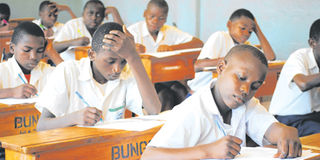Prime
Why national assessments need review, major reforms

Pupils sit for their exams. PHOTO|FILE
What you need to know:
- The debate on Saturday stemmed from concerns that the assessments, designed to measure students' understanding and competence, have inadvertently transformed into pre-national examinations, deviating from their intended purpose.
Dar es Salaam. Education experts have said the Standard Four and Form Two national assessments should be reviewed to ensure that they truly serve the intended purpose of guiding both educators and students in their academic progress.
The debate on Saturday stemmed from concerns that the assessments, designed to measure students' understanding and competence, have inadvertently transformed into pre-national examinations, deviating from their intended purpose.
The catalyst for this discourse was the release of the 2023 national assessment results by the National Examinations Council of Tanzania (Necta) on January 7, 2024. According to the data, 83.34 percent of Standard Four students and 85.31 percent of Form Two students successfully moved on to the next academic level.
However, beneath these seemingly positive figures lies a complex narrative, prompting educational experts to question the authenticity of the assessments.
An educational consultant at HakiElimu, Dr Wilberforce Meena, spoke of the misalignment between the current assessment methodology and its intended purpose. He said that the assessments should serve as a diagnostic tool, gauging students' competence and guiding teachers on how to support their progression.
However, he lamented that the present structure resembles a national examination, with students focusing on exam preparation rather than showcasing their true understanding of the curriculum.
"We need to know where the problem is through assessment so that teachers know where to increase their efforts so that students can do well at the level they are going to," Dr Meena expressed.
One significant concern raised by Dr Meena is the standardised nature of the assessments, which may disadvantage students from different schools with varying resources, teachers, and learning environments.
He proposed decentralisation as a potential solution, allowing regions to conduct assessments tailored to their specific educational contexts. This, he believed, could lead to fairer evaluations and a more accurate reflection of students' competencies.
In contrast, a retired head teacher, Ms Hawa Bundara, acknowledged the necessity of national assessments but emphasised the importance of schools covering the syllabus before conducting these evaluations.
She recognised the challenges faced by teachers in meeting this requirement but advocated for research to improve testing procedures, accounting for the diverse school environments, equipment, and teacher capabilities.
"The assessment is seen as a national exam, but the schools are supposed to have covered required areas of the syllabus in order to conduct the national assessment, but, due to various challenges, find themselves unable to achieve the goal before the assessment," Ms Bundara explained.
Adding a unique perspective, Philip*, a teacher from a private school, acknowledged the pressure to perform well in assessments. However, he revealed that the focus in his school was not solely on assessing competency but also on building trust with parents and guardians.
“This duality, where passing becomes the primary goal, raises questions about the effectiveness of the assessments in truly measuring students' understanding and competence,” he acknowledged.
Necta, on the other hand, emphasises the role of assessments in gauging students' understanding and skills based on the teaching and learning objectives outlined in the syllabus. The council states that assessments serve multiple purposes, including monitoring students' progress, improving teaching methods, and identifying learning challenges.
The 2014 education and training policy, 2023 edition, and updated curricula aim to address these concerns and enhance the competency assessment process, according to Dr Basil Mtegema, an expert on curriculum and policy issues.
Dr Mtegema asserted that the new policy provides solutions to the challenges associated with national exams and assessments. However, he acknowledged the need for a thorough review of current assessments to bridge the transition until the new policy is fully implemented.
Looking at the new policy, it introduces a revamped system of assessment, emphasising continuous monitoring of students' progress and final evaluations at the end of each term. It also outlines the purpose of national examinations at the end of Standard II, IV, and VI as a means of ensuring the validity and reliability of internal assessments.
“These national exams are not intended for selection purposes but rather to identify learning gaps and provide targeted support before students’ progress to the next class,” reads part of the new policy.





